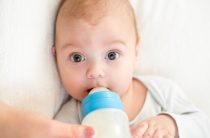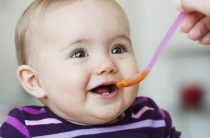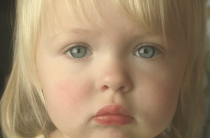Allergies in a nursing mother need to be treated unconditionally, with virtually no restrictions on drugs, giving preference to aerosols and inhalers. When an allergy or intolerance has also arisen in a child, the mother should follow a hypoallergenic diet in order to prevent allergens from entering breast milk.
It is very important to carry out the natural breastfeeding of a child as long as possible, since “artificial” babies are more susceptible to the influence of hereditary allergic diseases. Also, breast milk can help the baby adapt to allergenic substances.
Causes of allergies in a nursing mother
Most anti-allergy drugs are harmless to the child, so breastfeeding mothers can and should be treated.
Until the baby is six months old, you can not take only certain types of drugs - drugs containing theophylline. The advantage should be given to inhalers, using which, a smaller dose of medication enters the circulatory system and, accordingly, into the milk of nursing mothers.
Also, it will be effective to take activated charcoal and other sorbents for several weeks.
Allergy triggers
The type of allergy depends on what kind of allergens provoked it. In infants, allergic reactions often occur due to the penetration of food provocateurs into the body during breastfeeding.
When a child grows up, the most common factors that cause allergies in him are allergens contained in the air (dust, gas), skin irritants, and drugs. They can also be pet hair and dander, insect venom, food mites.
A food allergy in a baby appears on those foods that his mother eats. Allergies can be triggered by citrus fruits, berries, chocolate, sweets, milk, eggs, chemical food additives and dyes, preservatives. Sometimes meat, bakery products, cereals contribute to its appearance. Since the process of digestion takes approximately 2-4 hours, an allergy in a baby manifests itself after approximately the same period of time.
The likelihood of a food allergy in a child increases significantly if one of his parents or both are allergic. Thus, the risk of developing an allergy for a newborn, in which one parent is allergic, is thirty-seven percent, if both are sixty-two.
Not only heredity affects the development of allergies in a baby. Of great importance is also hypoxia during pregnancy or childbirth. Also, respiratory viral and intestinal infections can cause allergies in infants.
Food allergies occur due to the fact that the baby's digestive tract is not yet fully formed: an insufficient amount of enzymes is produced in the body, their activity is still very low, and few IgA antibodies are produced, which are designed to protect the intestinal mucosa from pathogenic agents. Plus, the mucous membranes of newborns are very permeable, allergens can easily enter the bloodstream through them. And, of course, malnutrition of the mother during pregnancy, namely the use of highly allergenic foods, can provoke the development of allergic reactions in the child.
A negative impact is also exerted by the mother's smoking while carrying a child, the presence of heart and vascular diseases, bronchial and lung diseases of a chronic form, and infectious diseases that were treated with antibiotics. It is believed that children whose mothers, being pregnant, consumed cow's milk, eggs, caviar, seafood, brightly colored fruits and vegetables, juices from them, coffee, cocoa, chocolate, are considered to have the greatest risk of becoming allergic.
What are the manifestations of allergies?
The first manifestations of an allergy in a baby are rashes and redness of the skin, they are also supplemented by diaper rash, even despite careful care, there are very frequent diarrhea, regurgitation, and the formation of seborrheic crusts on the scalp.
Symptoms of food allergies in children are discolored stools, an unpleasant odor, irritation around the anus, pain in the abdomen, due to which the child becomes very irritable and nervous. In these cases, you should definitely make an appointment with a doctor.
So, the main signs of an allergy in a baby are:
- The appearance of a rash on the body;
- redness;
- Itching and flaking of the skin;
- Strong diaper rash;
- Prickly heat;
- Gneiss on the scalp;
- Quincke's edema.
Since an allergy in a child during breastfeeding is accompanied by a lesion of the gastrointestinal tract, he has the following symptoms:
- bloating;
- colic;
- constipation;
- diarrhea (foamy greenish feces);
- vomit;
- regurgitation.
When an allergy affects the respiratory tract (swelling of the nasal mucosa occurs), the patient has the following symptoms:
- allergic rhinitis;
- bronchospasm (difficulty breathing).
Quincke's edema is of great danger , in which the mucous membranes of the respiratory tract, namely the larynx, swell, and air cannot enter the lungs normally. Thus, the child's voice immediately becomes hoarse, after which there is a barking cough, shortness of breath with loud breathing. The complexion becomes blue, then becomes very pale.
Sometimes the above symptoms are combined with each other, and several organs and systems are affected at once: skin, bronchi, intestines. Food allergies may precede atopic dermatitis, bronchial asthma.
hypoallergenic diet for allergies
The basis of the treatment of such an allergy is the observance of a hypoallergenic diet by a nursing mother. Any allergenic product should be excluded from the diet.
When one month has passed, you can return a certain product again, but this should be done gradually, in small portions. After each intake of such a product, it is observed that the child does not have such a reaction again. With its repeated manifestation, the product is excluded from the menu for a very long time.
Principles of following a hypoallergenic diet:
- No need to overeat;
- It is necessary to exclude from the mother's diet products in which allergens are found. Such food can provoke cross-reactions (for example, an allergic reaction to pollen occurs if the human body reacts poorly to citrus fruits, sunflower oil, halva). Also, foods that contain a lot of histamine should not be consumed.
- Diversify your menu as much as possible within the limits of permitted products.
- Drink the right amount of liquid.
You need to eat the same product not very often, so that allergens do not accumulate in large quantities in the body. After all, when the “critical point” is reached, the child will have an allergy. The best solution would be to keep a food diary, which will indicate the food and the time of its intake.
The menu of a young mother should not contain eggs, mushrooms, nuts, honey, coffee, cocoa, vegetables, brightly colored fruits and berries, salty and spicy dishes, spices, preservatives, dyes, carbonated drinks, kvass, sauerkraut, fermented cheeses, beer .
Allowed the use of sour-milk products, cereals, vegetables and fruits of white and green colors, vegetarian soups, meat, wheat and rye bread, drinks such as tea, compote, fruit drink.
When you buy ready-made products in the store, you should carefully study their composition. Some of them may contain highly allergenic components. So, for the preparation of confectionery products, eggs and non-natural food additives are used.
Almost all boiled sausages, sausages, sausages contain spices, sodium nitrite, which gives a pink color. All yoghurts and kefirs with a shelf life of more than two weeks are not natural and therefore allergenic. It is also better to refrain from fast food.
Drinking at least 2 liters of water a day, a person contributes to the rapid removal of various harmful substances from the body. Juices and fruit drinks, weak tea can also be drunk, but only in limited quantities. Sometimes it is useful to drink special drinks that are necessary to maintain lactation.
If such dietary nutrition does not improve the child's condition, it is necessary to make an appointment with a doctor. He will prescribe a special anti-allergic therapy.
If allergens still remain in breast milk, the therapeutic effect of this kind of therapy does not last long. If necessary, the baby will undergo an immunological study, thus excluding or confirming diseases of the gastrointestinal tract. This must be done to make sure that the allergy is not related to intestinal infections, genetically transmitted diseases.
Should I give up breastfeeding?
The best option would be to continue breastfeeding. A baby, even with a predisposition to allergies, who is breastfed, will more easily respond to allergens that come to him with food if it is digested with the help of mother's milk.
Thus, mother's milk can help the baby adapt to allergens, absorb food in the best way. Allergic mothers, in turn, should try to contact allergens in the shortest possible time.
The woman's attending physician and pediatrician will be able to finally answer the question of stopping breastfeeding.
Diagnosis - Allergy in infants
When the first symptoms of an allergy to breast milk in a child begin to appear, you should immediately consult a doctor for advice. This doctor can be a pediatrician, an allergist, a nutritionist. If the symptoms of allergy are severe, and in particular if they are combined with other lesions (skin rash, malfunction of the gastrointestinal tract), hospitalization may be necessary.
An accurate diagnosis can be made by:
- Interviews with parents and relatives;
- Establishing relationships between the appearance of allergies and the use of certain foods;
- I will examine the baby;
- Blood tests that will show what level of total globulin E and how many eosinophils in the blood;
- Ultrasound of the abdominal organs, which will allow you to accurately determine the factor provoking allergies, excluding non-allergic factors from the digestive system.
Indirect evidence of a food allergy is considered to be the disappearance of its symptoms after the mother stopped taking certain foods, and the appearance of positive results after antihistamine treatment was carried out.
To such a common question as: “what exactly could provoke a food allergy in a child?”, They give a clear answer after they receive the results of a venous blood test for the presence of special immunoglobulins E. The causes of allergies in older children are determined using the skin test method. To do this, the most common allergens are applied to a small area of \u200b\u200bthe child's skin, and the reaction is expected to appear for some time. Such a study should be carried out before and after drug therapy.
Treatment of allergies in infants
To cure food allergies, doctors prescribe antihistamines, sorbents, various topical creams and ointments, including hormonal ones, in very severe cases of allergies, hormones are administered intravenously. The intestinal microflora is corrected by taking medications containing bifidobacteria and lactobacilli.
If bronchospasm occurs due to allergic edema, the following actions should be taken:
- Call an ambulance. If you have an antihistamine at home, you need to ask what dosage would be optimal for the child.
- Give an antihistamine, which include Diphenhydramine, Diprazine, Diazolin, Suprastin, Claritin.
The most common cause of allergies in a child who is on artificial or mixed feeding is cow's milk protein , found in formulas for children. Therefore, it is worth only partially or completely replacing this mixture with a special hypoallergenic one. It is based on soy protein, or one that is split into individual amino acids. Their disadvantages are that a child may become intolerant to soy, and hydrolyzed mixtures are not very tasty and not accessible to everyone.
When the source of the allergy is found, changes are made to the previously prescribed hypoallergenic diet - this product is excluded. You need to follow this menu from one to three months.
Once the product is eliminated, the allergy symptoms should decrease or disappear, that's when the mom's diet can be gradually diversified.
Preventive measures for food allergies
If possible, you should avoid giving complementary foods to a child under six months of age. It is necessary to feed the baby only those types of baby food that will not cause allergies, preferably one-component. After the child has reached the age of two, you can try to feed him cow's milk, chicken eggs, citrus fruits, wheat products, fish, seafood, nuts.
It is worth remembering the following statements:
- Any product that is used to feed a child, especially a very small one, can provoke allergic reactions.
- You need to make sure that bowel movements are regular. Then, when constipation in children can increase allergies, or provoke its appearance. Due to irregular bowel movements, allergens do not leave it on time, but accumulate and are absorbed into the blood.
- It is advisable not to use syrups for the treatment of allergies, which contain a lot of dyes and flavors that cause or increase allergies.
- During water procedures, it is necessary to ensure that the water temperature is not too high. The duration of water procedures should not be less than twenty minutes.
- It is necessary to use special children's hypoallergenic cosmetics.
- For bathing, filtered or settled water for a couple of hours, to which boiling water is added, is best suited. It is advisable not to swim in pools with water to which bleach is added, or immediately after that, rinse under a moderately warm shower, using mild hygiene products.
- It is forbidden to rub the child's skin with a washcloth; after bathing, it is worth gently blotting his skin with a soft towel and lubricating it with a moisturizing, emollient.
- It is worth buying clothes for a child only from natural fabrics, if allergic reactions are very pronounced, it needs to be ironed. Fillers for duvets and pillows should be synthetic.
- You need to dress your child according to the weather and temperature so that there is no overheating or hypothermia, which can cause allergic dermatitis.
- All synthetic detergents must be labeled "hypoallergenic".
- It is advisable not to have any pets, since their hair, saliva, dandruff, (and if we are talking about aquarium fish), even dry food, can provoke an exacerbation of allergies.
- It is necessary to carry out wet cleaning in the apartment regularly, to ensure that the air is clean, cool, moderately humid. Walking with a child is worth as much as possible.
Many parents are concerned about the question, can an allergy in a child stop with age? Improving the functions of the liver and intestines, strengthening the immune system can contribute to the fact that over the years the body of children ceases to react to dairy products, eggs, vegetables. Allergies will pass faster if parents follow the doctor's recommendations and take anti-allergic measures. Only two percent of children who suffer from food allergies as infants remain allergic for life.
Anyone who wants to learn more about allergies in a breastfeeding baby should contact our consultant.















